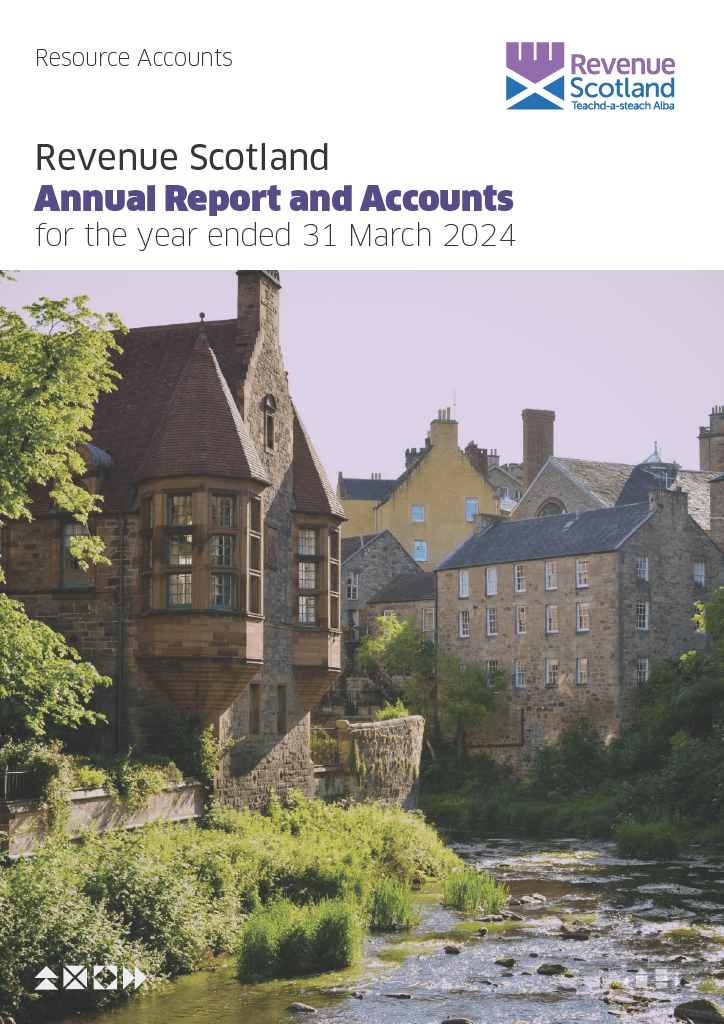Independent Auditor’s Report
Independent auditor’s report to Revenue Scotland, the Auditor General for Scotland and the Scottish Parliament
Reporting on the audit of the financial statements
Opinion on financial statements
I have audited the financial statements in the annual report and accounts of Revenue Scotland (Resource Accounts) for the year ended 31 March 2024 under the Public Finance and Accountability (Scotland) Act 2000. The financial statements comprise the Statement of Comprehensive Net Expenditure, the Statement of Financial Position, the Statement of Cash Flows, the Statement of Changes in Taxpayers’ Equity and notes to the financial statements, including material accounting policy information. The financial reporting framework that has been applied in their preparation is applicable law and UK adopted international accounting standards, as interpreted and adapted by the 2023/24 Government Financial Reporting Manual (the 2023/24 FReM). In my opinion the accompanying financial statements:
- give a true and fair view of the state of the body's affairs as at 31 March 2024 and of its net expenditure for the year then ended;
- have been properly prepared in accordance with UK adopted international accounting standards, as interpreted and adapted by the 2023/24 FReM; and
- have been prepared in accordance with the requirements of the Public Finance and Accountability (Scotland) Act 2000 and directions made thereunder by the Scottish Ministers.
Basis for opinion
I conducted my audit in accordance with applicable law and International Standards on Auditing (UK) (ISAs (UK)), as required by the Code of Audit Practice approved by the Auditor General for Scotland. My responsibilities under those standards are further described in the auditor’s responsibilities for the audit of the financial statements section of my report. I was appointed by the Auditor General on 3 April 2023. My period of appointment is five years, covering 2022/23 to 2026/27. I am independent of the body in accordance with the ethical requirements that are relevant to my audit of the financial statements in the UK including the Financial Reporting Council’s Ethical Standard, and I have fulfilled my other ethical responsibilities in accordance with these requirements. Non-audit services prohibited by the Ethical Standard were not provided to the body. I believe that the audit evidence I have obtained is sufficient and appropriate to provide a basis for my opinion.
Conclusions relating to going concern basis of accounting
I have concluded that the use of the going concern basis of accounting in the preparation of the financial statements is appropriate.
Based on the work I have performed, I have not identified any material uncertainties relating to events or conditions that, individually or collectively, may cast significant doubt on the body’s ability to continue to adopt the going concern basis of accounting for a period of at least twelve months from when the financial statements are authorised for issue.
These conclusions are not intended to, nor do they, provide assurance on the body’s current or future financial sustainability. However, I report on the body’s arrangements for financial sustainability in a separate Annual Audit Report available from the Audit Scotland website.
Risks of material misstatement
I report in my Annual Audit Report the most significant assessed risks of material misstatement that I identified and my judgements thereon. Responsibilities of the Accountable Officer for the financial statements As explained more fully in the Statement of Accountable Officer’s Responsibilities, the Accountable Officer is responsible for the preparation of financial statements that give a true and fair view in accordance with the financial reporting framework, and for such internal control as the Accountable Officer determines is necessary to enable the preparation of financial statements that are free from material misstatement, whether due to fraud or error.
In preparing the financial statements, the Accountable Officer is responsible for using the going concern basis of accounting unless there is an intention to discontinue the body’s operations.
Auditor’s responsibilities for the audit of the financial statements
My objectives are to obtain reasonable assurance about whether the financial statements as a whole are free from material misstatement, whether due to fraud or error, and to issue an auditor’s report that includes my opinion. Reasonable assurance is a high level of assurance, but is not a guarantee that an audit conducted in accordance with ISAs (UK) will always detect a material misstatement when it exists. Misstatements can arise from fraud or error and are considered material if, individually or in the aggregate, they could reasonably be expected to influence the decisions of users taken on the basis of these financial statements.
Irregularities, including fraud, are instances of non-compliance with laws and regulations. I design procedures in line with my responsibilities outlined above to detect material misstatements in respect of irregularities, including fraud. Procedures include:
using my understanding of the central government sector to identify that the Public Finance and Accountability (Scotland) Act 2000 and directions made thereunder by the Scottish Ministers are significant in the context of the body;
- inquiring of the Accountable Officer as to other laws or regulations that may be expected to have a fundamental effect on the operations of the body;
- inquiring of the Accountable Officer concerning the body’s policies and procedures regarding compliance with the applicable legal and regulatory framework;
- discussions among my audit team on the susceptibility of the financial statements to material misstatement, including how fraud might occur; and
- considering whether the audit team collectively has the appropriate competence and capabilities to identify or recognise non-compliance with laws and regulations.
